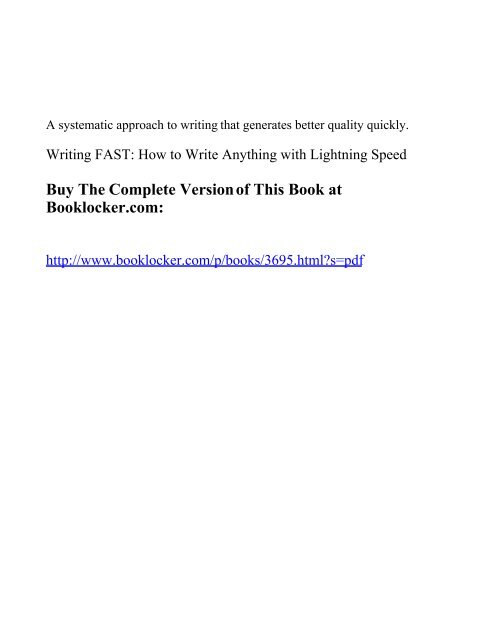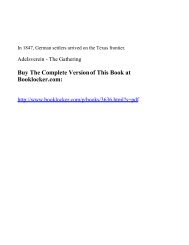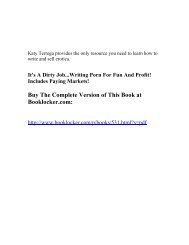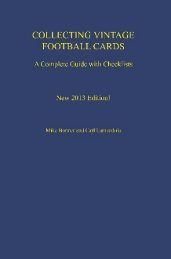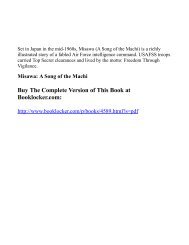Writing FAST: How to Write Anything with Lightning Speed
Writing FAST: How to Write Anything with Lightning Speed
Writing FAST: How to Write Anything with Lightning Speed
Create successful ePaper yourself
Turn your PDF publications into a flip-book with our unique Google optimized e-Paper software.
A systematic approach <strong>to</strong> writing that generates better quality quickly.<br />
<strong>Writing</strong> <strong>FAST</strong>: <strong>How</strong> <strong>to</strong> <strong>Write</strong> <strong>Anything</strong> <strong>with</strong> <strong>Lightning</strong> <strong>Speed</strong><br />
Buy The Complete Version of This Book at<br />
Booklocker.com:<br />
http://www.booklocker.com/p/books/3695.html?s=pdf
<strong>Writing</strong> <strong>FAST</strong>
<strong>Writing</strong><br />
<strong>FAST</strong><br />
<strong>How</strong> <strong>to</strong> <strong>Write</strong> <strong>Anything</strong><br />
<strong>with</strong> <strong>Lightning</strong> <strong>Speed</strong><br />
jeff bollow<br />
embryo films (publishing)
embryo films<br />
(publishing division)<br />
PO Box 300<br />
Artarmon NSW 1570<br />
Australia<br />
embryo-films.com/publishing<br />
writing<strong>FAST</strong>.com<br />
First Edition<br />
Copyright © 2004 by Jeff Bollow<br />
All worldwide rights reserved.<br />
No part or whole of this book may be reproduced in any<br />
format, whether physical or electronic, in any media<br />
whatsoever <strong>with</strong>out express written permission of the author.<br />
Jeff Bollow hereby asserts his moral rights<br />
<strong>to</strong> be identified as author of this work.<br />
National Library of Australia Cataloguing-in-Publication Entry<br />
Bollow, Jeff.<br />
<strong>Writing</strong> <strong>FAST</strong>: how <strong>to</strong> write anything <strong>with</strong> lightning speed.<br />
ISBN 0 9752139 0 3.<br />
1. <strong>FAST</strong> (<strong>Writing</strong> system). 2. <strong>Writing</strong>. 3. Authorship.<br />
4. Motion picture authorship. I. Title.<br />
808.066<br />
First printing (Limited Edition), May 2004<br />
Second printing (First Edition), August 2004<br />
Manufactured in Australia<br />
<strong>Writing</strong> <strong>FAST</strong>, the <strong>FAST</strong> system, <strong>FAST</strong>screenplay,<br />
<strong>FAST</strong>screenwriting, and Talktation are<br />
trademarks or registered trademarks of<br />
embryo films and <strong>FAST</strong>entertainment
for those who see beyond<br />
what is already here<br />
may this help you show us<br />
what you see
Thank-you<br />
To Missi, for your incredible support and encouragement,<br />
and for your love; you are a truly beautiful person.<br />
To Dad, for your patience and belief, and for your friendship;<br />
it helps in ways that even “fast” words can’t describe.<br />
To my students, for teaching me more than I ever taught<br />
you; please get off your butts and apply this stuff.<br />
And <strong>to</strong> you, the reader, for taking this plunge; you make my<br />
efforts worthwhile.
Table of Contents<br />
Introduction 3<br />
What Are You Talking About? * A Brilliant I...dea *<br />
Dazed and Confused * A Whole New Approach * The<br />
Whole World Sings * What’s Inside (And What’s Not Inside)<br />
The Setup 9<br />
1 Why <strong>Write</strong> <strong>FAST</strong>? 11<br />
What’s in S<strong>to</strong>re for You in this Book * What’s in S<strong>to</strong>re<br />
When You’re Done * What Do You Want <strong>to</strong> <strong>Write</strong>? *<br />
<strong>Writing</strong> <strong>FAST</strong> Versus <strong>Writing</strong> Slow * Couldn’t Possibly<br />
Be Me * The Battle for Time * Your Chance <strong>to</strong> Change<br />
the World * It’s All Communication * Simplifying the<br />
Complex * And so...<br />
2 Why You Hate <strong>Writing</strong> 21<br />
It’s Okay, You Can Admit It * Excuses, Excuses * Meet<br />
Your Brain * Everybody’s A Critic * Your Head is Faster<br />
than Your Hands * The Idea Fac<strong>to</strong>ry * Two Different<br />
Worlds * Judge, Jury and Executioner * I’ll Get <strong>to</strong> It<br />
Later * And so...<br />
3 Meet the <strong>FAST</strong> System 31<br />
The <strong>FAST</strong> System Overview * Why You Need a System *<br />
Three Definitions * Invent a Deadline * What’s the Big<br />
Idea? * The First Priority * Break it Down in<strong>to</strong> Chunks *<br />
Master Talktation * Twist it All in<strong>to</strong> Shape * Sharpen it<br />
In<strong>to</strong> a Fast Read * And so...<br />
Focus<br />
Turn Your Idea In<strong>to</strong> A Plan 43<br />
4 Capture Your Idea 45<br />
The Objective of this Phase * The Elusive Idea * One<br />
Single Sentence * Get Excited About It * Use Your Fear<br />
<strong>to</strong> Find It * Nail the Real Idea * Let Ideas Spark Ideas *<br />
The Great S<strong>to</strong>rm * Capture Your Idea in 5 Easy<br />
Steps * And so...
5 Make Your Idea Specific 55<br />
<strong>How</strong> <strong>to</strong> Make an Idea Specific * The Best Demonstration *<br />
Jump In * Create a Preview * Setup and Payoff * The<br />
Reader’s Journey * Test it Out * Make Your Idea<br />
Specific in 5 Easy Steps * And so...<br />
6 Attach Your <strong>Lightning</strong> Rod 65<br />
The <strong>Lightning</strong> Rod * Create a Power Grid * Broad Strokes<br />
<strong>to</strong> Micro Strokes * Decide the End Result * Do a Little<br />
Math (Just a Little) * Structure and Chunking * Fill in the<br />
Details * <strong>Lightning</strong> Rod Boosters * Your Focus Plan<br />
in 5 Easy Steps * And so...<br />
Apply<br />
Turn Your Plan In<strong>to</strong> Words 75<br />
7 Talktation: The New Art of <strong>Speed</strong> <strong>Writing</strong> 77<br />
The Objective of this Phase * What is “speed writing”? *<br />
Connect <strong>with</strong> Your mind * Keep Up <strong>with</strong> the <strong>Lightning</strong> *<br />
Introducing Talktation * Talk it On<strong>to</strong> the Page * The<br />
<strong>Speed</strong> of Your Keys * Talktation in 5 Easy Steps *<br />
And so...<br />
8 Harness Your Idea Overflow 87<br />
Non-linear Overflow * Too Many Ideas * Personal<br />
Interference * Focus on the Road Ahead * Throw Your<br />
Ideas in the BIN * Grow the Idea Tree * Recycle for a<br />
Boost * 5 Easy Steps <strong>to</strong> Harness the Overflow *<br />
And so...<br />
9 Ride Your Wave <strong>to</strong> the End 97<br />
A Different Kind of Wave * Chunking Pays Off * <strong>Write</strong><br />
<strong>to</strong> Your Checkpoints * Find the Optimal Flow * Take<br />
Breathers * Perfection is a Headspace * Riding the<br />
Wave in 5 Easy Steps * And so...<br />
Strengthen<br />
Turn Your Words In<strong>to</strong> Gold 105<br />
10 Inspect What You Have 107<br />
The Objective of this Phase * Inspect from a Distance *<br />
Nothing Personal * Feel the Overall Effect * The Logic of<br />
Your Work * Your Rhythm and Flow * Missing and<br />
Redundant Ideas * Your Problem List * Inspect Your<br />
Work in 5 Easy Steps * And so...
11 Decide Which Way <strong>to</strong> Go 117<br />
The Big Decisions * Grade Your <strong>Writing</strong> * The Stack Test *<br />
When <strong>to</strong> Re-Focus * When <strong>to</strong> Research * When <strong>to</strong> Edit *<br />
When <strong>to</strong> Tweak * Create a Strengthen Plan * Decide<br />
Which Way <strong>to</strong> Go in 5 Easy Steps * And so...<br />
12 Amplify for Maximum Effect 127<br />
One Step at a Time * The Stages of Revision * Control the<br />
Outcome * Clarity and Impact * Cutting, Blending and<br />
Rearranging * Fix and Move On * Objective Feedback *<br />
Strengthen on 20 Minutes a Day * Amplify Your <strong>Writing</strong><br />
in 5 Easy Steps * And so...<br />
Tweak<br />
Turn Your Gold In<strong>to</strong> <strong>Speed</strong> 137<br />
13 Sharpen the <strong>Speed</strong> of the Read 139<br />
The Objective of this Phase * The Philosophy of Tweak *<br />
Control the Ride * Macro, Micro, Sentence * The Words on<br />
the Whole * Impact Points * Beyond Instinct * The <strong>Speed</strong><br />
of Emotion * Sharpen Your Read <strong>Speed</strong> in 5 Easy<br />
Steps * And so...<br />
14 Techniques that Command Attention 149<br />
Spice and Variety * Visual Imagery * Metaphors and<br />
Analogies * Suspense and Anticipation * Placement and<br />
Emphasis * Time and the Temporal Shift * Show Don’t<br />
Tell * Command Attention in 5 Easy Steps *<br />
And so...<br />
15 Quicken and Polish 159<br />
The Fine Print * Spelling and Grammar * Paragraphs and<br />
Length * Sentence Construction * Vague, Cliché,<br />
Unnecessary * The Importance of Doing this Last *<br />
Knowing When <strong>to</strong> Let Go * Quicken and Polish in<br />
5 Easy Steps * And so...<br />
The Payoff 167<br />
16 The <strong>FAST</strong> System in the Real World 169<br />
The Battle Against Time * Short-form <strong>Writing</strong> * The Longform<br />
<strong>Writing</strong> Problem * Life’s Little Distractions * Motivation<br />
and Procrastination * Cus<strong>to</strong>mizing <strong>FAST</strong> * <strong>FAST</strong> Means<br />
Fast * The <strong>FAST</strong> System on 20 Minutes a Day * And so...
17 Squeeze the Most Out of <strong>FAST</strong> 179<br />
The Mental Pre-Flight * Quickly Break Down <strong>Anything</strong> *<br />
The Idea is the Key * Flexible Deadlines * Some Phases Will<br />
Take Longer * Fall in Love <strong>with</strong> Words * No Comparison *<br />
Learn <strong>to</strong> Type * And so...<br />
18 <strong>How</strong> <strong>to</strong> Reach <strong>Lightning</strong> <strong>Speed</strong> 189<br />
Practice Makes Perfect * Always <strong>FAST</strong> * Daily Pages *<br />
Email * Hardwiring Your Brain * What is <strong>Lightning</strong> <strong>Speed</strong><br />
Really? * And so...<br />
Epilogue<br />
And so... 199<br />
More <strong>FAST</strong> <strong>to</strong> Come * The Second Edition *<br />
A Word About My Teaching * Beyond <strong>Writing</strong> <strong>FAST</strong> *<br />
Final Thoughts<br />
About the Author 205<br />
Reference Chart<br />
The <strong>FAST</strong> System Step-by-Step 206<br />
A step-by-step chart showing each phase of the system,<br />
each movement <strong>with</strong>in that phase, and the “5 Easy Steps”<br />
of each movement.<br />
More Information 208
“<br />
We are what we repeatedly do.<br />
Excellence then, is not an act,<br />
but a habit.<br />
—Aris<strong>to</strong>tle<br />
”
There’s only one reason I’ve written this book. And it’s found<br />
<strong>with</strong>in this introduction. If you don’t grasp that reason, you’ll<br />
still be able <strong>to</strong> use the <strong>FAST</strong> System <strong>to</strong> write anything <strong>with</strong> lightning<br />
speed.<br />
But you’ll miss the whole point of the book.<br />
So I’d ask you — please — <strong>to</strong> read the introduction. Every<br />
s<strong>to</strong>ry needs a context. This is the context for the <strong>FAST</strong> System.<br />
And I promise you this: The <strong>FAST</strong> System, when properly<br />
unders<strong>to</strong>od and applied, will revolutionize the way you write. It’s<br />
simple, it’s effective, and it works.<br />
But I never wanted <strong>to</strong> write it.<br />
What Are You Talking About?<br />
Introduction<br />
In fact, if you had <strong>to</strong>ld me just one year ago that I’d be writing<br />
this book (and writing it in 8 weeks, no less!), I would have<br />
laughed. And probably walked away from you.<br />
A year ago, I was disillusioned. I had become something I<br />
specifically did not want <strong>to</strong> become. I had become a respected<br />
and highly-regarded screenwriting teacher. Or, as one of my students<br />
put it: “the screenwriting guy.”<br />
God I hate that.<br />
Don’t get me wrong. I love screenwriting, and I actually<br />
enjoy teaching the stuff. I don’t even have a problem <strong>with</strong> screenwriting<br />
teachers in general. It’s a valid career, and it’s certainly
4 W r i t i n g F A S T<br />
necessary. (I wish they had a better grasp of what they were<br />
teaching sometimes, but what can ya do?)<br />
But I wasn’t “the screenwriting guy.” Was not. Am not.<br />
I’m just a guy <strong>with</strong> a vision. And it can’t be built <strong>with</strong>out<br />
dozens (probably hundreds) of excellent screenplays.<br />
I’m a guy on the prowl, looking for scripts.<br />
See, I want <strong>to</strong> build an independent feature film studio, and<br />
produce 3 <strong>to</strong> 6 movies per year. All kinds of movies. And I want<br />
<strong>to</strong> build it from the ground up. To prove it can be done.<br />
So when I couldn’t find any screenplays (any commerciallyviable<br />
ones, anyway), I did whatever I could think of <strong>to</strong> get people<br />
writing them. Taught workshops. Imported software.<br />
Assessed scripts. Men<strong>to</strong>red writers. Everything. I created<br />
Screenplay.com.au.<br />
But I never considered myself a writer. I’d write if I had <strong>to</strong>,<br />
but I make movies. I always found the writing part <strong>to</strong>rturous.<br />
But movies don’t get made <strong>with</strong>out screenplays, so I need writers.<br />
Back <strong>to</strong> square one.<br />
In my home<strong>to</strong>wn of L.A., everyone’s got a screenplay tucked<br />
under their arm. Even the waiters. Especially the waiters. You<br />
can go <strong>to</strong> lunch at Denny’s and feel like you’re right in the middle<br />
of the studio system.<br />
But when I moved <strong>to</strong> Australia, I found a very different landscape.<br />
Not only were the waiters really waiters, no one else<br />
seemed <strong>to</strong> be writing any screenplays either.<br />
So I did what any self-respecting producer would do.<br />
I tried <strong>to</strong> corner the market on screenwriting.<br />
A Brilliant I...dea<br />
Tell me this isn’t a great idea: I would develop a workshop <strong>to</strong><br />
teach emerging writers how <strong>to</strong> write commercially-viable screenplays<br />
— from the producer’s perspective. Marketable screenplays<br />
producers would actually want <strong>to</strong> buy.<br />
And because I’m a producer who’s been through the entire<br />
process myself — from start <strong>to</strong> finish — I’d show my students<br />
what really works and what really doesn’t. And then, naturally,<br />
I’d be the first producer they’d turn <strong>to</strong> when they finished their<br />
screenplay.<br />
Not a bad idea, right?
<strong>How</strong> <strong>to</strong> <strong>Write</strong> <strong>Anything</strong> <strong>with</strong> <strong>Lightning</strong> <strong>Speed</strong> 5<br />
Well, yeah, in theory. In practice, something else happened.<br />
I unwittingly started a new career.<br />
It began <strong>with</strong> an eight-week First Draft Workshop designed <strong>to</strong><br />
take writers “from concept <strong>to</strong> completion.” But I quickly realized<br />
that my students didn’t even know the fundamentals. Eight<br />
weeks was just <strong>to</strong>o quick. We needed more time for the basics.<br />
So I pulled the workshop apart, and created a weekend workshop<br />
<strong>to</strong> cover the fundamentals: The Essential Screenwriting<br />
Workshop would be “everything you need <strong>to</strong> know before you<br />
write your screenplay.” And a prelude <strong>to</strong> the eight-weeker.<br />
I planned <strong>to</strong> run them until I found a core group of writers<br />
who wanted <strong>to</strong> join me, and churn out material I could produce.<br />
Cut <strong>to</strong> four years later.<br />
I had done 56 weekend workshops <strong>with</strong> 641 participants,<br />
aged 15 <strong>to</strong> 72, in six cities across Australia and New Zealand. I<br />
had spent over $100,000, barely made a subsistence income, and<br />
put up <strong>to</strong> 80 hours a week in<strong>to</strong> them.<br />
And nearly 100% of participants raved about the workshops.<br />
They said they would “enthusiastically recommend” them. I was<br />
very proud.<br />
But a pattern had emerged.<br />
As it turned out, less than 5% of participants actually did<br />
anything <strong>with</strong> the information. Less than 5% wrote anything at<br />
all. 95% of my effort was being wasted.<br />
Dazed and Confused<br />
These were good, intelligent people. From all backgrounds<br />
and levels. Smart people. I knew I could share this alarming fact<br />
<strong>with</strong> them. So I would say, “Statistically, I will only hear from<br />
two of you ever again.” In one workshop, a woman raised her<br />
hand and replied, “I’d like <strong>to</strong> know who the other one is.”<br />
The class laughed.<br />
And I never heard from her again.<br />
Why? Why was this happening? I had become a screenwriting<br />
teacher. I had taken my attention away from getting films<br />
produced. And I had nothing <strong>to</strong> show for it. I needed <strong>to</strong> find out<br />
why. So I asked my students.<br />
And overwhelmingly, the response I got was this: “Things<br />
keep coming up.” “I’m <strong>to</strong>o busy.” “<strong>Writing</strong> a screenplay is a
6 W r i t i n g F A S T<br />
huge project, and I don’t have the time <strong>to</strong> get through it.”<br />
Let me say this right now. If you don’t write, you’ll never get<br />
better at it. Practice makes perfect. So if you don’t make time <strong>to</strong><br />
write, how can you get good enough <strong>to</strong> sell your work?<br />
And (more importantly <strong>to</strong> me) how will I ever get enough<br />
screenplays <strong>to</strong> achieve my vision?!<br />
I remembered my favorite quote from the late great acting<br />
teacher, Sanford Meisner. It goes like this:<br />
“That which hinders your task is your task.”<br />
So if no one has time <strong>to</strong> write, that’s what I’ve got <strong>to</strong> do.<br />
Show them a way <strong>to</strong> write, even if they don’t have time.<br />
A Whole New Approach<br />
So the first thing I did was fall out of a plane.<br />
January 2nd, 2004. My first freefall.<br />
There’s something about skydiving that’s simply electrifying.<br />
It’s life on the edge. It’s fast. It’s extreme. And, for me at least,<br />
it shocked my senses back in<strong>to</strong> focus.<br />
Within a week, my life suddenly made sense again.<br />
I had gone on a four-year de<strong>to</strong>ur. It was time <strong>to</strong> put my workshops<br />
in<strong>to</strong> a box. A box I could offer <strong>to</strong> the serious students.<br />
That way, I could continue “teaching,” and still get back <strong>to</strong><br />
making films. And if only 5% of readers ever applied it, I’d still<br />
be moving forward. No time would be wasted.<br />
But if I was going <strong>to</strong> put my workshops in a box, it had <strong>to</strong> be<br />
perfectly clear, and it needed <strong>to</strong> obliterate this time problem.<br />
And then it hit me.<br />
The reason was obvious! My students loved the workshops,<br />
but didn’t do anything <strong>with</strong> it. Why? They didn’t have a system<br />
for applying it. I had given them <strong>to</strong>ns of valuable information —<br />
practical stuff they could use immediately — but they didn’t walk<br />
away <strong>with</strong> a system for writing. A system that works.<br />
So I would develop one. I wanted something that would help<br />
people beat the time crunch. Something that would help them<br />
write fast.<br />
That was it! <strong>FAST</strong>. F.A.S.T. What a perfect acronym <strong>to</strong><br />
describe what we’re trying <strong>to</strong> do. You want <strong>to</strong> write fast. I want<br />
<strong>to</strong> read fast. <strong>Writing</strong> is a four-part process, and the letters fit the<br />
four parts perfectly...
<strong>How</strong> <strong>to</strong> <strong>Write</strong> <strong>Anything</strong> <strong>with</strong> <strong>Lightning</strong> <strong>Speed</strong> 7<br />
You’d laugh if you knew how excited I got. Suddenly the<br />
world made sense. Finally, I could help writers master this seemingly<br />
impossible craft. And in the process, I could get you writing<br />
screenplays I could produce.<br />
Fantastic.<br />
The Whole World Sings<br />
I mapped out this workshop-in-a-box, and I called it<br />
<strong>FAST</strong>screenplay. It would be a step-by-step approach <strong>to</strong> writing<br />
a screenplay. It wouldn’t be about formulaic plots, or “write-likethis”<br />
rules. No. I've met enough writers and read enough screenplays<br />
<strong>to</strong> know that no “formula” really works.<br />
Instead, <strong>FAST</strong>screenplay would be a system for writing a<br />
screenplay. You’d power through your script, blasting past the<br />
time problem, creating a compelling original screenplay.<br />
When I finished mapping it out, I noticed something.<br />
Ironically, I was using the <strong>FAST</strong> System <strong>to</strong> create <strong>FAST</strong>screenplay.<br />
It dawned on me: The <strong>FAST</strong> System works across the board!<br />
Not just screenwriting, but all forms of writing. And when I<br />
looked closer at it, it made perfect sense. It’s a systematic<br />
approach <strong>to</strong> writing.<br />
And then I thought about Australia’s armpits. And, specifically,<br />
how none of them were carrying any screenplays. <strong>How</strong>, in<br />
fact, embarrassingly few Australian writers have even considered<br />
screenwriting. Many don’t even know what it is, or what it looks<br />
like.<br />
What if — instead — I wrote a book about the <strong>FAST</strong> System<br />
in general (as it applies <strong>to</strong> any kind of writing)? I could kill two<br />
birds <strong>with</strong> one s<strong>to</strong>ne.<br />
I could show you how <strong>to</strong> write anything faster and better.<br />
And at the same time, I could reach a much wider audience.<br />
Sooner or later, I’m bound <strong>to</strong> bump in<strong>to</strong> a would-be screenwriter,<br />
right?<br />
And that brings us <strong>to</strong> <strong>Writing</strong> <strong>FAST</strong>. I have ulterior motives<br />
here. I’m not looking <strong>to</strong> start a new career on the lecture circuit.<br />
And I don’t want <strong>to</strong> become a guru.<br />
I want you <strong>to</strong> use the <strong>FAST</strong> System for whatever you want <strong>to</strong><br />
write.<br />
But I’m secretly hoping you’ll write screenplays.
8 W r i t i n g F A S T<br />
What’s Inside (and What’s Not Inside)<br />
Now, before we leap in<strong>to</strong> it, I need <strong>to</strong> clarify a couple things.<br />
<strong>Writing</strong> <strong>FAST</strong> is not about grammar and tense and viewpoint<br />
and punctuation. We’ll get in<strong>to</strong> some of that in the Tweak section,<br />
but this book assumes you have a decent understanding of<br />
the English language.<br />
If you don’t, you must learn that stuff. Effective writing isn’t<br />
filled <strong>with</strong> typos and errors and point-of-view mistakes. There’s<br />
no shame in not knowing it. But when you discover you don’t<br />
know it, it’s time <strong>to</strong> learn.<br />
There are dozens of books on the subject. You don’t need <strong>to</strong><br />
read them now, but don’t avoid them afterwards. <strong>Writing</strong> is<br />
about communicating your ideas. And the better you understand<br />
your language, the better you can use it.<br />
<strong>Writing</strong> <strong>FAST</strong> is also not about speed writing. We do cover it<br />
(in detail), but it’s only one part of the <strong>FAST</strong> System (the Apply<br />
section). And it’s not even the most important thing. <strong>FAST</strong> is an<br />
approach <strong>to</strong> the whole process. <strong>Speed</strong> writing is only one fourth<br />
of the equation.<br />
And I’m not going <strong>to</strong> make ridiculous promises. Can you<br />
write a book in 2 weeks, or 4 weeks, like some speed writing<br />
advocates claim? Maybe you can. Maybe you can write even<br />
faster! But I don’t know you. I have no idea what your natural<br />
abilities are. So I refuse <strong>to</strong> make such blanket promises.<br />
What’s more important <strong>to</strong> me is that your work reads fast.<br />
Clunky, cumbersome writing is a chore <strong>to</strong> read, no matter how<br />
fast you wrote it. The Tweak Section will certainly help (a lot!).<br />
But it, <strong>to</strong>o, takes practice. Just remember. It’s not a race <strong>with</strong><br />
anyone else. Life is a race <strong>with</strong> yourself.<br />
<strong>Writing</strong> <strong>FAST</strong> is a simple, step-by-step approach <strong>to</strong> the<br />
process of writing. I want <strong>to</strong> give you a way <strong>to</strong> smash the time<br />
barrier, so you never have an excuse for not writing again.<br />
I say that <strong>Writing</strong> <strong>FAST</strong> will help you write ten times as fast<br />
as you do right now. If you truly apply it, you’ll do a lot better<br />
than that. And I can’t wait <strong>to</strong> hear your feedback when you do.<br />
You’re gonna have so much fun.<br />
Ready <strong>to</strong> get started?
[The Setup]
“<br />
Nothing leads so straight <strong>to</strong> futility<br />
as literary ambitions <strong>with</strong>out<br />
systematic knowledge.<br />
—H.G. Wells<br />
”
1<br />
Why <strong>Write</strong> <strong>FAST</strong>?<br />
The written word started out as a picture.<br />
Way back in prehis<strong>to</strong>ric times, life was slow. People would<br />
hunt and gather all day, and then come home <strong>to</strong> the cave and<br />
grunt at each other around the campfire. There wasn’t a whole<br />
lot of reading and writing going on — fast or otherwise.<br />
But one day (and I’m taking a little “creative license” here),<br />
some guy named Ooga saw a mammoth for the first time. It<br />
scared the crap out of him. He ran back <strong>to</strong> the cave <strong>to</strong> warn his<br />
friends (let’s call them Booga and Shooga), but they just scratched<br />
their heads. Booga and Shooga had never seen a mammoth<br />
before, so Ooga’s frantic grunting wasn’t making any sense.<br />
(Maybe they should take him out back, and club him for awhile?)<br />
But Ooga was serious. That hairy, oversized elephant was<br />
huge. With tusks and everything. It could kill them! He needed<br />
his friends <strong>to</strong> understand. But he didn’t have the right grunt <strong>to</strong><br />
describe it. So he grabbed a piece of tree bark, and drew a picture<br />
of the mammoth on the wall.<br />
After Booga freaked out (grunting angrily about vandalism<br />
and such), Shooga grabbed his arm. She sat him down and made<br />
him stare at Ooga’s crude drawing. And, gradually, the image of<br />
the mammoth filled their minds. They unders<strong>to</strong>od.<br />
And written communication was born.<br />
Today, some thirty-five thousand years later, we communicate<br />
<strong>with</strong> different kinds of pictures. Our pictures are drawn <strong>with</strong><br />
words. With words, we can create images of incredible subtlety
12 W r i t i n g F A S T<br />
and complexity. For example, I just painted the image of some<br />
cavemen, their cave drawings, and even a glimpse of their social<br />
structure, <strong>with</strong>out any graphics at all.<br />
And, just like Booga and Shooga, you saw that scene in your<br />
mind’s eye. You saw the mammoth.<br />
<strong>Writing</strong> is communicating your idea <strong>with</strong> the written word.<br />
And writing <strong>FAST</strong> is doing it quickly and effectively.<br />
What’s In S<strong>to</strong>re For You in this Book<br />
This book will teach you how <strong>to</strong> write fast.<br />
Not just speed writing techniques (although there are some<br />
whoppers in here). But also techniques for nailing your idea.<br />
Figuring out exactly what you’re trying <strong>to</strong> say, and then giving<br />
you a razor-sharp plan <strong>to</strong> get there.<br />
This book will give you a system. One that works for any<br />
kind of writing. It’s a system that — when you fully understand<br />
it — will make writing simple. You’ll even have a two-minute<br />
checklist <strong>to</strong> immediately break down even the most complex writing<br />
projects. And an easy acronym <strong>to</strong> remember it by.<br />
This book is not about me. <strong>Writing</strong> is never about the author.<br />
This book is about you. I want you <strong>to</strong> understand this system. I<br />
want you <strong>to</strong> see how it works. And I want you <strong>to</strong> be able <strong>to</strong> use<br />
it. To apply it. Immediately.<br />
If you’ve looked at the Table of Contents, you already know<br />
the “big picture.” But we’re about <strong>to</strong> go way deeper.<br />
With <strong>FAST</strong>, you can break down any complex writing job —<br />
from thousand-page novels and screenplays <strong>to</strong> simple letters and<br />
emails — and write them faster than you ever imagined possible.<br />
This book will go beyond just the four-part process of writing.<br />
We’ll look at specific tips, techniques and methods <strong>to</strong> make<br />
sure you not only write faster than ever before, but better, as well.<br />
We’ll look at things like “chunking,” which simplifies the<br />
huge task of long-form writing. I’ll introduce you <strong>to</strong> Talktation,<br />
my brand new technique for speed writing. You’ll discover the<br />
Stack Test, and watch it lift the quality of your work. And you’ll<br />
find dozens of ways <strong>to</strong> “speed up” your writing, so your reader<br />
hangs on every word, and can’t turn away.<br />
If I do my job right, you’ll breeze through this book. It<br />
should be a quick and easy read. And <strong>with</strong> any luck, ideas will
Why <strong>Write</strong> <strong>FAST</strong>? 13<br />
be popping in<strong>to</strong> your head on every page.<br />
To make it easy, this book is broken down in<strong>to</strong> six sections.<br />
First is The Setup. Every word you write falls in<strong>to</strong> one of two<br />
categories — Setup or Payoff — so I’ve included them as sections,<br />
<strong>to</strong> remind you. All ideas need a context, or they won’t be unders<strong>to</strong>od.<br />
The setup gives us that context. (In the caveman s<strong>to</strong>ry, the<br />
“Way back...” paragraph is the setup.)<br />
Next are sections for each of the four parts of the <strong>FAST</strong><br />
System itself: F(ocus), A(pply), S(trengthen), T(weak). That’s the<br />
meat of the system. You’ll spend varying amounts of time on<br />
each part of the process, as you need <strong>to</strong>. But do each part in that<br />
order. You only struggle when you jump around.<br />
The final section shows you how <strong>to</strong> apply it: The Payoff. The<br />
payoff is where an idea becomes clear and usable. It’s when you<br />
go “Ah!” The payoff is what all writing is really about. (See if<br />
you can identify the Payoff in the caveman s<strong>to</strong>ry, and I’ll tell you<br />
if you’re right a little later.)<br />
What’s In S<strong>to</strong>re When You’re Done<br />
When you’re done <strong>with</strong> this book, you’ll write ten times faster<br />
than you ever did before. You’ll write <strong>with</strong> lightning speed — the<br />
speed of thought. And I’m completely and <strong>to</strong>tally serious.<br />
Here’s how it’ll work:<br />
An idea will pop in<strong>to</strong> your head. Maybe it’s a book, a novel,<br />
screenplay, article, report... whatever. Within a few short hours<br />
(for the long stuff) or just a few minutes (for the short stuff),<br />
you’ll know exactly what <strong>to</strong> write on every single page.<br />
Then you’ll write it. And I mean fast. It’s so easy, in fact,<br />
you’ll be amazed. It’s as if the book is just flowing out of you.<br />
Then you’ll inspect what you’ve written. Here’s where most<br />
speed writing techniques fail, and most writers get discouraged.<br />
But not <strong>with</strong> <strong>FAST</strong>. As you read your work, you’ll immediately<br />
spot dazzling ways <strong>to</strong> transform it in<strong>to</strong> gold. Problems leap out.<br />
And the solutions are crystal clear.<br />
And finally, almost as if you’ve got magic fingers, you’ll sift<br />
through your work... twisting, tugging, and straightening out<br />
every kink, and making your writing electrifying.<br />
You’ll complete your book (or whatever you’re writing) in<br />
record time, impressing everyone you know (especially yourself!).
14 W r i t i n g F A S T<br />
Readers will love it. You’ll grab them <strong>with</strong> your style, and they’ll<br />
hang on every word. You’ll be writing fast in every sense.<br />
That’s what’s in s<strong>to</strong>re for you when you finish this book.<br />
No more writers block. Ever.<br />
No more battling <strong>with</strong> Time. You’ll have a system for writing,<br />
even if you can only squeeze in twenty minutes a day.<br />
No more getting intimidated by big projects. You’ll wonder<br />
how they ever scared you in the first place.<br />
No more tired, boring, bloated writing. You’ll keep your<br />
reader glued.<br />
I want you <strong>to</strong> get excited. I want you <strong>to</strong> read this book from<br />
cover <strong>to</strong> cover as quickly as possible, and then refer <strong>to</strong> it later<br />
when you need <strong>to</strong>. Because as soon as you’re done, you’re going<br />
<strong>to</strong> reach lightning speeds. Almost as fast as you can think.<br />
What Do You Want <strong>to</strong> <strong>Write</strong>?<br />
To get an idea of just how powerful this <strong>FAST</strong> System really<br />
is, let’s rattle off some of the things you can write <strong>with</strong> it.<br />
A screenplay. A novel. A non-fiction book. A textbook. A<br />
technical book. A magazine article. A news s<strong>to</strong>ry. A television<br />
show. An essay. A dissertation. A homework assignment. An<br />
au<strong>to</strong>biography. Somebody else’s biography. A report. A business<br />
plan. A website. A proposal. A journal. A travelogue. A diary.<br />
A short s<strong>to</strong>ry. A novella. A bible. A procedure book. A<br />
brochure. An advertisement. A manual. A pamphlet. An email.<br />
A play. A critique. A letter. A white paper. A manifes<strong>to</strong>. A<br />
handbook. A newsletter. A bulletin. A query. A review...<br />
I’m sure there are a hundred more, but you get the idea.<br />
You’ll use the <strong>FAST</strong> System <strong>to</strong> write every single one of these.<br />
In fact, here’s a secret I’ll get <strong>to</strong> in a minute: You must use a system<br />
<strong>to</strong> write any of them! That’s why the <strong>FAST</strong> System is such a<br />
breakthrough. It harnesses the power of your mind.<br />
Each type of writing has its own purpose. So, what makes<br />
good screenwriting is different <strong>to</strong> what makes good novel writing.<br />
But the approach is identical. They’re all communication, and<br />
that’s what this book is all about.<br />
Think about what you want <strong>to</strong> write. Is it a book? A novel?<br />
A personal newsletter? A screenplay?<br />
Pick one. Right now. And hold on<strong>to</strong> it.
Why <strong>Write</strong> <strong>FAST</strong>? 15<br />
Having an example project as you read through this book will<br />
help you visualize each step. It’ll make it more practical.<br />
Apply everything you learn <strong>to</strong> your example. And watch as<br />
it unfolds before your eyes.<br />
<strong>Writing</strong> <strong>FAST</strong> Versus <strong>Writing</strong> Slow<br />
Here’s the first major lesson: <strong>Writing</strong> is not an activity. It’s<br />
not something you sit down at the keyboard, and just start doing.<br />
That’s called “typing.”<br />
Typing is an activity. Scribbling words on<strong>to</strong> paper is an activity.<br />
Dictating in<strong>to</strong> a microphone is an activity.<br />
<strong>Writing</strong> is not an activity.<br />
<strong>Writing</strong> is a process. And if you start thinking of it as a<br />
process, life gets so much easier.<br />
Here’s how it works. You have an idea. You want <strong>to</strong> express<br />
it on the page. You use the process of writing <strong>to</strong> say it in the most<br />
effective way possible.<br />
The difference between writing fast and writing slow is how<br />
fast the idea pours out of you. (Simple enough.) But understand<br />
this: When you write slow, you’re over-analyzing. You’re jumping<br />
ahead in the process. You’re stifling your own idea!<br />
On the other hand, when you write fast, you’re tapping in<strong>to</strong><br />
your idea, and letting it spill out on<strong>to</strong> the page. You’re using the<br />
process <strong>to</strong> work its magic. You’re trusting the outcome.<br />
The <strong>FAST</strong> System helps you write fast. It helps you discover,<br />
understand, and shape your idea. It provides techniques <strong>to</strong> get<br />
your ideas on the page faster. And it makes sure your idea is<br />
expressed as perfectly as possible.<br />
If you’ve been writing <strong>with</strong>out a system, you’ve been spinning<br />
your wheels. You’ve been keeping yourself busy <strong>with</strong> an activity.<br />
It’s time <strong>to</strong> try the process.<br />
Couldn’t Possibly Be Me<br />
If you’re new <strong>to</strong> writing, you might have wri<strong>to</strong>phobia. (Yes,<br />
I just made up a word.) I used <strong>to</strong> have it, <strong>to</strong>o. It’s when “real”<br />
writers scare the bejeezus out of you.<br />
I never expected <strong>to</strong> write professionally. At first, I was intimidated<br />
by writers, just like you are. I had an image in my head of
16 W r i t i n g F A S T<br />
exactly what a writer looks like. And it certainly wasn’t me.<br />
You know the image. It’s that guy in the log cabin on that<br />
sprawling wooded property in the mountains. The one <strong>with</strong> no<br />
television set, and seven hundred hardcover books on crowded<br />
little bookshelves. The guy <strong>with</strong> the beard, who wears glasses<br />
(but only when he’s reading), and is probably <strong>to</strong>o smart <strong>to</strong> have a<br />
normal conversation <strong>with</strong>. (Aw, let’s face it, he’s Stephen King.)<br />
Anyway, after four years of teaching screenwriting, my wri<strong>to</strong>phobia<br />
disappeared. <strong>How</strong>? I met people who write. In four<br />
years, I met over six hundred writing students. And I can tell you<br />
this. Maybe three of them fit that image. The rest looked like<br />
everyone else in the world.<br />
But here’s the kicker. I also taught professional writers —<br />
people <strong>with</strong> film credits, published novels, journalists, magazine<br />
columnists, playwrights — they were just like everyone else, <strong>to</strong>o!<br />
The entire mystique of writing fades away when you get a<br />
load of who does this stuff.<br />
We’re all people. We all have the same potential.<br />
So if you’re a novice, know this: All you need <strong>to</strong> do is apply<br />
the <strong>FAST</strong> System, and practice. Good writing is good writing. It’s<br />
not the exclusive domain of some mysterious aris<strong>to</strong>cracy.<br />
And if you’re a professional, you already have the discipline<br />
it takes <strong>to</strong> sit in a chair for extended periods of time. Now you’ll<br />
accomplish twice as much, <strong>with</strong> less time in the chair. (And that’s<br />
being conservative!)<br />
See, writing is writing. Wherever you are on the food chain,<br />
it’s all the same. A systematic approach will get you there faster.<br />
Even if you’re Stephen King.<br />
(Although from what I hear, he’s already lightning fast.)<br />
The Battle for Time<br />
Now usually, it’s just an excuse. But one of the biggest reasons<br />
students give for not writing is a lack of time. You lead a<br />
busy life. You’ve got a career <strong>with</strong> business trips and meetings.<br />
Or maybe you’ve got two jobs and three kids. Or perhaps it’s a<br />
full schedule of classes and homework <strong>with</strong> a part-time job.<br />
Look around. We’re all busy. We watch days, weeks,<br />
months, and years go by <strong>with</strong>out achieving the things we had<br />
resolved <strong>to</strong> achieve at the start of the year.
Why <strong>Write</strong> <strong>FAST</strong>? 17<br />
If you need eight hours a day for six months straight <strong>to</strong> write<br />
your book, it’s just not gonna happen. A screenplay isn't guaranteed<br />
income, so the kids come first. A report isn’t urgent, so it<br />
gets pushed down the To-Do list. The newsletter won’t be done<br />
this month because of the sales meeting. And so on.<br />
And when these things happen, you feel a tremendous sense<br />
of frustration. Even guilt. Sometimes stress. You know it, I<br />
know it. You can’t get out from under it and it drives you crazy.<br />
In a way, the <strong>FAST</strong> System is a time-management technique.<br />
I was tired of hearing my students say they didn’t have enough<br />
time. (I was tired of not having enough time myself!)<br />
Even if you only have ten minutes a day <strong>to</strong> write (which is<br />
never really the case, but let’s go <strong>with</strong> it), the <strong>FAST</strong> System will<br />
help you. In fact, if you really tuck in<strong>to</strong> it, amazing things are<br />
possible. What if you could write a book in just a few months,<br />
using the <strong>FAST</strong> System on ten minutes a day? Some readers will.<br />
It might take practice, but wouldn’t it be worth it?<br />
Your Chance <strong>to</strong> Change the World<br />
Now this might sound corny, but I believe you’re capable of<br />
more than you imagine. And I think every last one of us has at<br />
least one unique, major, world-changing idea inside us. And if we<br />
don’t reveal it in our lifetime, it gets lost forever.<br />
For example, mine might be the <strong>FAST</strong> System. (I think I’ve<br />
got a couple more, but I’ll save them for another time.)<br />
<strong>FAST</strong> is a lucky discovery. If I had made one different choice<br />
at any point along the way, I wouldn’t be writing this book.<br />
And if I didn’t, some of my readers might never muster the<br />
confidence <strong>to</strong> write theirs.<br />
It’s a chain effect. My ideas help spark your ideas. Your ideas<br />
will help spark someone else’s ideas.<br />
Let’s take an imaginary chain.<br />
Suppose a businessman makes a startling discovery about<br />
how his cus<strong>to</strong>mers interact. Until <strong>FAST</strong>, he could never find time<br />
<strong>to</strong> write a book about his discovery. But now he can. He does.<br />
Meanwhile, a scientist is working on a life-saving drug. He’s<br />
never heard of <strong>FAST</strong>, but he reads the businessman’s book. And<br />
it sparks an idea: “What if the chemicals in this drug interacted<br />
the same way those cus<strong>to</strong>mers did?” Suddenly, he solves a riddle
18 W r i t i n g F A S T<br />
he’s been working on for five years. He writes a breakthrough<br />
white paper on how <strong>to</strong> cure this rare disease.<br />
A doc<strong>to</strong>r in a remote country <strong>to</strong>wn reads the white paper. He<br />
has just delivered a child who happens <strong>to</strong> have the rare disease.<br />
The doc<strong>to</strong>r would’ve misdiagnosed it just six months before. But<br />
now he can treat the child easily. And a young couple will see<br />
their daughter grow in<strong>to</strong> an Olympic medalist.<br />
This isn’t fiction. It’s an imaginary scenario, but that’s exactly<br />
the kind of sequence life takes. That’s exactly how knowledge<br />
builds. Ideas spark ideas.<br />
And if you follow this logic, I believe it’s vitally important<br />
that you share your own life’s discoveries. No matter how inconsequential<br />
they seem <strong>to</strong> you, they could spark an idea in someone<br />
else — something you couldn’t possibly imagine. The businessman<br />
in our example could never predict that his book would be<br />
responsible for solving the riddle of a life-saving drug. The businessman<br />
knows nothing about biochemistry. He only knows<br />
about his cus<strong>to</strong>mers’ interactions.<br />
But where does that spark lead?<br />
Where does your spark lead?<br />
Will you let this book spark you?<br />
It’s All Communication<br />
There’s a myth that’s been passed down from generation <strong>to</strong><br />
generation. And I have <strong>to</strong> admit, it’s tempting <strong>to</strong> continue that<br />
tradition. Catch me at the wrong moment, in fact, and I will.<br />
The myth is that writing is hard work. That it’s something<br />
only a very special kind of person can do.<br />
<strong>Write</strong>rs throughout the ages have promoted that myth (some<br />
even believe it), because it helps their mystique. Think about it.<br />
What kind of reaction do you get if you’re sitting next <strong>to</strong> someone<br />
on a plane, and when they ask what you do, you hand them<br />
your book?<br />
What’s the reaction? It’s magical, isn’t it? Suddenly, they’re<br />
in awe. There’s a reverence for you. You’re a writer. That’s<br />
something they could never do!<br />
Or so they think. (And you probably let them think it, <strong>to</strong>o!)<br />
C’mon. That’s ridiculous.<br />
Not only can anyone do it, I believe everyone should do it.
Why <strong>Write</strong> <strong>FAST</strong>? 19<br />
<strong>Writing</strong> is not the mythical realm of the gods. <strong>Writing</strong> is really<br />
very simple. It’s effective communication. It’s putting your<br />
ideas in<strong>to</strong> words that will be clear in a distant time and place.<br />
Nothing more.<br />
It takes time <strong>to</strong> learn. (What doesn’t?) It takes practice <strong>to</strong> get<br />
good at. (What doesn’t?) But if I can do it, you can do it. And<br />
the passenger next <strong>to</strong> you can do it, <strong>to</strong>o.<br />
Short-form writing (a letter, email, web page, short s<strong>to</strong>ry) has<br />
a quick point. Long-form writing (a book, novel, screenplay) has<br />
a more elaborate point, or more layers and depth. Large ideas<br />
will take planning and organization.<br />
For example, I can communicate <strong>FAST</strong> (Focus, Apply,<br />
Strengthen, Tweak) in four words. But the depth and breadth of<br />
the idea — the detail you’ll need <strong>to</strong> use it effectively — takes quite<br />
a bit longer <strong>to</strong> express. I’m using eighteen chapters.<br />
But it’s all communication. I can do it fast, or I can do it slow.<br />
And so can you.<br />
Simplifying the Complex<br />
The real problem is that you have a million possible choices.<br />
And there’s virtually no way <strong>to</strong> know which one’s “right.”<br />
I believe this chapter will put you in the right frame of mind<br />
<strong>to</strong> understand the <strong>FAST</strong> System. I think it’ll be a useful framework<br />
for you. (And when I re-read it later, if I think I was wrong,<br />
I’ll adjust it. [Which I just did.])<br />
But I could put a nearly infinite combination of words on this<br />
page right now <strong>to</strong> express this idea. Which one’s right? Which<br />
one’s better than all the rest? Which one’s wrong?<br />
Truth is, you’re looking in the wrong place. There is no<br />
“right” or “wrong.” There are only varying degrees of effectiveness.<br />
And that’s what makes writing so incredibly challenging.<br />
(Which fosters the myth that writers are so mysterious.)<br />
When you read a published book (a good one, anyway), it’s<br />
well-written. It’s clever. Concise. Simple. It looks like the writer<br />
did it effortlessly. You think <strong>to</strong> yourself, I could never do that.<br />
But why not? It’s only a matter of communicating. Of turning<br />
the ideas in your head, in<strong>to</strong> words on a page. And making<br />
sure the idea is as dynamic on the page as it was in your head.<br />
Enter the <strong>FAST</strong> System.
20 W r i t i n g F A S T<br />
Suddenly, the process is simple. <strong>FAST</strong> walks you step-by-step<br />
through it. It breaks it down in<strong>to</strong> manageable pieces. It keeps<br />
you from getting lost. And that’s its power.<br />
To all the writers out there who promote the mystique that<br />
writing is hard, I formally apologize for ruining it for you.<br />
But I believe that every one of us has something <strong>to</strong> share, and<br />
if a writer doesn’t share it, I (personally) might miss out on the<br />
chain effect of their spark. And what if it’s something that could<br />
change or save my life?<br />
I want you <strong>to</strong> write. And because I want that, I’m going <strong>to</strong><br />
show you how <strong>to</strong> take what appears <strong>to</strong> be a complex process, and<br />
make it simple, fast, effective and fun!<br />
That’s how the chain works.<br />
And so...<br />
<strong>Writing</strong> is a process, and <strong>with</strong>out a simple, step-by-step<br />
approach <strong>to</strong> that process, you’re creating unnecessary work for<br />
yourself. Why struggle <strong>with</strong> something that should be easy?<br />
In this chapter, I’ve tried <strong>to</strong> put you in the right frame of<br />
mind, <strong>to</strong> get the most out of this system. Remember, every idea<br />
needs a context. And that’s what this chapter is all about.<br />
For <strong>FAST</strong>, the context is this: All writing is communication.<br />
It’s so easy <strong>to</strong> get lost when your idea could go in any one of a<br />
million different directions. By applying the <strong>FAST</strong> System, you<br />
put yourself on a clear, simple road.<br />
And it’s right there <strong>to</strong> help you, during each of the most challenging<br />
phases of writing. It will help you, stabilize you, and get<br />
you back on track, every step of the way.<br />
And your results will be startling.<br />
You’ll nail down your idea in record time. You’ll blast<br />
through the writing. You’ll quickly spot problems and know<br />
exactly how <strong>to</strong> fix them. And then you’ll turn it all in<strong>to</strong> a lightning-fast<br />
read.<br />
If you’re not excited yet, don’t worry. I’m excited enough for<br />
the both of us. Because I know what’s in s<strong>to</strong>re for you when<br />
you’re done <strong>with</strong> this book.<br />
Sure, you’ll know how <strong>to</strong> write <strong>FAST</strong>.<br />
But more importantly, you’ll discover your spark.
2<br />
Why You Hate <strong>Writing</strong><br />
I guarantee you, someone out there got this book, reached<br />
this chapter, shook her head and frowned. Then she smiled<br />
(almost laughing at the rest of us), and thought <strong>to</strong> herself, I don’t<br />
hate writing. I LOVE writing!<br />
If that person is you, please forgive me. I’ve got <strong>to</strong> talk <strong>to</strong> the<br />
rest of the readers for a chapter. The 90% of people who (like<br />
me) have always felt that writing is agony. You can still read<br />
along, and see what mere mortals go through. But please sit quietly,<br />
and don’t snicker.<br />
Now then, back <strong>to</strong> you. Pay no attention <strong>to</strong> her. She’s probably<br />
off doing some creative writing exercise anyway. We’re<br />
alone now, and we can talk about the truth of this writing crap.<br />
You hate it, don’t you? Yeah, I feel your pain.<br />
There’s nothing worse than knowing you have <strong>to</strong> plant your<br />
butt in that chair and pound furiously at the keyboard for hours<br />
on end, thinking the whole time that your work is probably going<br />
<strong>to</strong> be terrible, and another day “writing” will have been wasted.<br />
I know you want <strong>to</strong> give up. I know you want <strong>to</strong> chuck the<br />
computer out the window. I know you want <strong>to</strong> scream at the <strong>to</strong>p<br />
of your lungs sometimes.<br />
I know.<br />
And that’s why I decided <strong>to</strong> take this chapter and explain<br />
exactly why you hate it so much. Why it’s so frustrating.<br />
And how <strong>to</strong> beat it.<br />
Because once you see why you hate it, you’ll begin <strong>to</strong> see
22 W r i t i n g F A S T<br />
exactly what you’re doing wrong.<br />
And then, best case scenario, you’ll be as excited about your<br />
writing as our snickering friend.<br />
Or the worst-case scenario, you can get through the writing<br />
you’ve just gotta get through.<br />
Like I am now.<br />
It’s Okay, You Can Admit It<br />
It’s probably sacrilegious <strong>to</strong> talk about what a terrible, evil<br />
thing writing is. Especially in a book about writing. After all,<br />
kids might be reading this. We don’t want them <strong>to</strong> think writing’s<br />
so awful, do we?<br />
Too bad. The first step in your road <strong>to</strong> recovery is <strong>to</strong> understand<br />
that we all hate writing. Even that goody-goody from the<br />
previous segment hates it (although she’d never admit it). She<br />
might not hate is as often as you or I do, but you’d better believe<br />
she’s got her moments.<br />
You’re not alone.<br />
To one degree or another, we all hate writing because we all<br />
get frustrated by it. In truth, it’s more of a love/hate relationship.<br />
We love it when we write something that rocks. But we hate it<br />
when our writing is atrocious.<br />
And since it seems <strong>to</strong> be atrocious more often than not, we<br />
hate it more often than we love it.<br />
The trouble is that writing is difficult <strong>to</strong> grasp. It’s amorphous.<br />
You can’t <strong>to</strong>uch it. Or feel it. There are no boundaries<br />
or edges <strong>to</strong> it. You can’t put it in a box.<br />
It’s a giant, shapeless void that doesn’t exist until it’s already<br />
done. And you can’t hold it up and say, “this is my writing.”<br />
Oh, sure, you can hold up pages <strong>with</strong> words on them. But<br />
that’s just words on pages. That’s not your writing. Your writing<br />
is the effect and the <strong>to</strong>tality of your expression.<br />
The only way someone can see your writing is by actively<br />
engaging it. By reading it. You can’t point <strong>to</strong> your writing from<br />
across the room. You can only point <strong>to</strong> the shape of your writing<br />
— the book, the magazine article, the letter.<br />
What this means is that writing has no single result. It does<br />
not have a specific, logical outcome, like a mathematical equation<br />
would have. It’s all fuzzy. It’s all aesthetic. Even two profession-
Why You Hate <strong>Writing</strong> 23<br />
al edi<strong>to</strong>rs at major publishing houses would edit this very manuscript<br />
in completely different ways.<br />
But there’s no “right” way <strong>to</strong> do it. Sure, you can be grammatically<br />
correct enough <strong>to</strong> impress your English teacher, but<br />
then a book like Trainspotting comes along, and offers a new<br />
“right” way. What about that? Hmm?<br />
And since there’s no “right” way, there also can’t be a<br />
“wrong” way. So how do you know if yours is any good or not?<br />
You use the same gauge most writers use. You end up comparing<br />
your writing <strong>to</strong> what you’ve read elsewhere.<br />
And that can be a killer.<br />
Excuses, Excuses<br />
When you’re afraid your work won’t hold up <strong>to</strong> comparison,<br />
what’s the first thing you do? <strong>Write</strong>? Of course not. The first<br />
thing you do is make excuses.<br />
And don’t tell me you don’t. I know you do. I hear excuses<br />
every time I ask my students how their writing is going.<br />
One of the biggest excuses is some form of the “I’m not good<br />
enough” category. You don’t write because you’re convinced<br />
your writing isn’t ready for prime time.<br />
Maybe you’ve got a favorite author whose words you compare<br />
yours <strong>to</strong>. The guy has probably been writing for thirty years,<br />
but if the first few sentences you plop on the page aren’t as good<br />
as his, you’re immediately certain there’s no hope for you.<br />
Let me say right now, you are good enough. And you’ll be<br />
even better when you s<strong>to</strong>p comparing your work <strong>to</strong> other writers.<br />
We’ll get <strong>to</strong> more of this idea later on.<br />
Another major excuse is the time thing. You don’t have time.<br />
You just moved house. You’re studying for your PhD. You just<br />
got married. Or divorced. You had kids. You changed jobs. You<br />
moved <strong>to</strong> another city. You’ve been away on business. You’ve<br />
had <strong>to</strong> look after a sick relative. You’ve had <strong>to</strong> fulfill your duties<br />
as mayor. Whatever.<br />
Believe it or not, that’s just your way of avoiding it. The<br />
busiest person in the world still needs <strong>to</strong> eat, sleep and... do other<br />
things. You could steal an extra twenty minutes a day if you<br />
wanted <strong>to</strong>. And I’ll show you how <strong>to</strong> use those twenty minutes<br />
most effectively in the coming chapters.
24 W r i t i n g F A S T<br />
Then there’s the “nothing <strong>to</strong> say” excuse. You don’t think<br />
you’ve got anything <strong>to</strong> write about. But your road is unique.<br />
You’ve got plenty <strong>to</strong> write about! Even if someone else has<br />
already written about it, your voice is original. Add your spark!<br />
<strong>How</strong> about the “I’m overwhelmed by it” excuse? You know.<br />
“A screenplay is <strong>to</strong>o big a project.” “I don’t think I’m ready for<br />
that.” Bah humbug! It may be true, but <strong>to</strong> use it as an excuse for<br />
not writing is weak and spineless. Just write it! If it’s terrible,<br />
you’ll learn something, and your next one will be better.<br />
Or the “writing is boring” excuse. You get fidgety. You find<br />
it tedious. Your brain goes numb when you attempt it. I won’t<br />
say <strong>to</strong>o much about this excuse, because when you’ve finished<br />
this book, you’ll never even think this one again.<br />
Excuses all come from the same place. You make excuses<br />
when you’re scared. When you’re convinced your writing is terrible.<br />
When you think you’ll be wasting your time by doing it.<br />
The remedy isn’t where you think it is. You’re looking in the<br />
wrong place. Where you need <strong>to</strong> look, instead, is inside your<br />
brain.<br />
Meet Your Brain<br />
As a writer, it helps <strong>to</strong> understand this grey matter inside your<br />
skull. After all, it’s your single most important <strong>to</strong>ol, right?<br />
Now, technically, scientists are already discovering that what<br />
I’m about <strong>to</strong> say isn’t quite right. But for our purposes, it’s the<br />
perfect analogy. And it’s a great way <strong>to</strong> understand why you hate<br />
writing so much. So I’m using it. Science be damned.<br />
In simplistic terms, your brain has two sides.<br />
The Right-brain and the Left-brain.<br />
The Right-brain is the creative, intuitive, free-thinking, artistic<br />
side of your brain. Your Right-brain is the side that plays the<br />
guitar and thinks about art, and comes up <strong>with</strong> crazy ideas and<br />
has lots of “hunches.” It even drives your car for you, until you<br />
suddenly snap out of your trance and realize you can’t remember<br />
driving those past ten minutes.<br />
The Left-brain is the side that snapped you out of it.<br />
The Left-brain is the analytical, logical, problem-solving, scientific<br />
side of the brain. Your Left-brain is the side that organizes<br />
your desk and plans your day, and decides you’d better not
Why You Hate <strong>Writing</strong> 25<br />
have that extra piece of chocolate. It does the math and keeps<br />
you from making a <strong>to</strong>tal fool of yourself in public (mostly).<br />
Everyone has (and needs) both sides. Some people may tend<br />
<strong>to</strong>ward one or the other, but both sides work their magic at all<br />
times. It’s an elaborate dance of give-and-take.<br />
But can you see the problem for writers?<br />
The problem is that both sides are always dancing <strong>with</strong> each<br />
other. Interfering. And writing demands the effective use of both<br />
sides of your brain. Not just one. Both. Each side in turn.<br />
And the reason you hate writing so much is because you start<br />
analyzing your work before you’re done pouring it on<strong>to</strong> the page.<br />
Your Left-brain won’t let your Right-brain do its job.<br />
That may work well for daily living, but it’s a killer for your<br />
writing. Because you can’t write effectively <strong>with</strong>out giving both<br />
sides their chance <strong>to</strong> shine.<br />
Your Right-brain gets the words on the page. The Left-brain<br />
makes them sing.<br />
Everybody’s a Critic<br />
Since I’m a movie guy, I have another analogy.<br />
I call them the Oscar-winner and the Movie Critic.<br />
Tell me if you recognize this scenario.<br />
One day, you have a brilliant idea for a s<strong>to</strong>ry (a screenplay, a<br />
novel, whatever). You love it. It’s fantastic! This may be the best<br />
idea you’ve ever had in your whole life.<br />
Inside your mind, there’s this little voice. I call him the Oscarwinner.<br />
And every time you come up <strong>with</strong> an idea, the Oscarwinner<br />
inside your mind goes nuts. He loves it. He thinks it’s the<br />
best idea since canned tuna. (He thinks your movie idea is going<br />
<strong>to</strong> win him an Oscar, see. Hence his name.)<br />
But the problem is that the Oscar-winner loves every idea you<br />
come up <strong>with</strong>. Just the fact that you have an idea, sends the<br />
Oscar-winner in<strong>to</strong> fits of hysteria. This idea is amazing! I’m so<br />
<strong>to</strong>tally pumped about this one! This one’s going all the way!!!<br />
And then you start writing.<br />
And then you notice the other voice inside your head. I call<br />
him the Movie Critic. He starts looking over what you’ve written.<br />
But he’s a critic, so he starts pointing out all its flaws and<br />
imperfections.
26 W r i t i n g F A S T<br />
Which can be a good thing. You don’t want <strong>to</strong> send your<br />
work out flawed, right?<br />
But this voice isn’t like a real movie critic. This one criticizes<br />
everything. He doesn’t offer a balanced review. He just shreds<br />
everything. “This is terrible.” “That’s horrible.” “That over<br />
there is downright embarrassing.”<br />
And before you know it, you’ve s<strong>to</strong>pped writing, because the<br />
Movie Critic has quashed the Oscar-winner’s enthusiasm. (Now<br />
he can’t even imagine winning an Oscar. ...What, <strong>with</strong> that crap?)<br />
You hate writing because you’re judging yourself every step of<br />
the way. The Oscar-winner is the Right-brain. The Movie Critic<br />
is the Left-brain. You need both. You couldn’t write your project<br />
on the enthusiasm of the Movie Critic. And you couldn’t<br />
objectively judge your project on the critique of the Oscar-winner.<br />
If you can recognize those two voices in your mind, you can<br />
give each their time in the spotlight. And you can yank them offstage<br />
when they’ve overstayed their welcome.<br />
Your Head is Faster than Your Hands<br />
But there’s an even deeper problem.<br />
As it turns out, your brain is just <strong>to</strong>o fast. (When was the last<br />
time you got that nice a compliment?!)<br />
It’s true.<br />
Those little neurons are firing in your head at lightning speed.<br />
They’re forming shapes. Ideas. Brilliance.<br />
But your fingers are madly clicking away, trying desperately<br />
<strong>to</strong> keep up. Unfortunately, they’re out here in the real world.<br />
Your fingers can’t move at the speed of thought. So it’s kinda like<br />
when you fall in<strong>to</strong> a swimming pool. The resistance of the water<br />
is so strong, you can’t just jump out again. You have <strong>to</strong> climb.<br />
So imagine you’re writing a page. You’ve got a clear idea of<br />
where you’re going on that page. But as you get in<strong>to</strong> it, suddenly<br />
those synapses start firing like crazy. Ideas spark ideas.<br />
You get halfway through a sentence, and your brain shoots<br />
out in a new direction. Problem is, it’s not the direction you<br />
intended <strong>to</strong> go on this page. But in the interest of speed (or “getting<br />
in<strong>to</strong> the rhythm”), you follow that direction.<br />
And then a couple paragraphs later, you realize you’ve gone<br />
astray. You’re dangling precariously on the edge of this branch.
Why You Hate <strong>Writing</strong> 27<br />
Not quite sure where you were going <strong>with</strong> this thread. Not quite<br />
sure how <strong>to</strong> tie all this back in<strong>to</strong> your original idea.<br />
You’re lost. And frustrated. Again.<br />
If this happens every time you try <strong>to</strong> write, it’s no wonder you<br />
hate it so much! You equate “writing” <strong>with</strong> “impossible,”<br />
because you can’t harness your ideas.<br />
And before you know it, you’re in trouble. You’re overwhelmed.<br />
It feels like you can’t stay focused. And if you can’t get<br />
through one page, how are you gonna complete a whole book?<br />
Why not just forget the whole thing?<br />
Sound familiar?<br />
The Idea Fac<strong>to</strong>ry<br />
It’s not surprising that your brain is single-handedly responsible<br />
for most of your writing woes.<br />
After all, your brain is where it all comes from. I call it the<br />
Idea Fac<strong>to</strong>ry. And as an Idea Fac<strong>to</strong>ry, your brain is pretty darned<br />
efficient.<br />
Too efficient, sometimes.<br />
Now, if you haven’t been giving your brain enough stimulation<br />
(or the right kind of stimulation), you might think your Idea<br />
Fac<strong>to</strong>ry is closed — out of business. You reach for an idea. You<br />
struggle <strong>to</strong> find it. You think and think until you have a<br />
headache. But, alas, you can’t come up <strong>with</strong> an idea <strong>to</strong> save your<br />
life. That frustration is probably the biggest single killer of all<br />
failed writing careers. (They call it “<strong>Write</strong>r’s Block.”)<br />
But when you stimulate your brain properly (which we’ll get<br />
<strong>to</strong> in the Focus section), your Idea Fac<strong>to</strong>ry kicks in<strong>to</strong> overdrive.<br />
See, your mind is designed <strong>to</strong> come up <strong>with</strong> ideas. That’s all it<br />
does. So if you let it, it will.<br />
In fact, it’ll come up <strong>with</strong> <strong>to</strong>o many. It doesn’t know when<br />
enough is enough, so it just keeps throwing ideas at you.<br />
(If you don’t have this problem yet, you’re probably thinking<br />
it would be a great problem <strong>to</strong> have. But I assure you, it creates<br />
a whole new set of troubles.)<br />
What happens is you get out there on a limb, and suddenly<br />
you have so many different possible directions <strong>to</strong> take it, you get<br />
paralyzed. Which idea is right? Which idea is best? Should I take<br />
my s<strong>to</strong>ry this way or that way?
28 W r i t i n g F A S T<br />
And you’re back <strong>to</strong> square one.<br />
S<strong>to</strong>pped. And struggling.<br />
Here’s what’s really going on. Your idea exists in your mind,<br />
where all ideas are perfect. (Your Oscar-winner can confirm that<br />
for you.) It’s perfect inside your mind because it’s fuzzy around<br />
the edges. Your brain fills in the gaps. It says, “Don’t worry<br />
about that missing part, something brilliant will go there.”<br />
But when you put it on the page, suddenly it’s not as good.<br />
All those missing parts are just gaps. You read your work back,<br />
and it’s nowhere near as good as it was in the Idea Fac<strong>to</strong>ry. And<br />
the discrepancy kills you. You think you’re terrible. And you run<br />
screaming in<strong>to</strong> the other room.<br />
You don’t want <strong>to</strong> do it anymore. It never comes out right.<br />
Two Different Worlds<br />
It’s just the difference between “Potential” and “Reality.”<br />
In your mind (when you think up this great idea), it’s potentially<br />
brilliant. But look. All ideas are potentially brilliant. (In<br />
fact, when people come up <strong>to</strong> me and say they’ve got a great idea<br />
for a movie, I reply, “Excellent! <strong>How</strong> good is the screenplay?”)<br />
If you want the reality <strong>to</strong> be brilliant, you need <strong>to</strong> express<br />
your idea in the most effective way possible. And that’s a judgment<br />
call. It’s up <strong>to</strong> you <strong>to</strong> find the best words.<br />
When you start typing, you’re converting that potential in<strong>to</strong><br />
reality. And reality is never as glamorous as potential. Never.<br />
You read your words back, and they bore you <strong>to</strong> tears.<br />
Or they’re confusing.<br />
Or they’re lame. Ineffective. Decidedly not compelling.<br />
And you think you’ll never get your idea out right. You get<br />
frustrated and angry and upset.<br />
And you hate writing. And you vow never <strong>to</strong> do it again.<br />
Understand this. You can — absolutely and positively — turn<br />
your idea in<strong>to</strong> a reality as rich and accurate as what you had in<br />
your mind. Yes, you can. Yes. You can. S<strong>to</strong>p shaking your head.<br />
You need <strong>to</strong> understand that this is a process. Yes, there are<br />
talented geniuses that fly through it <strong>with</strong>out batting an eye. But<br />
for the rest of us, there’s the process.<br />
And that’s what <strong>FAST</strong> is all about.<br />
Taking your idea from potential <strong>to</strong> reality.
Why You Hate <strong>Writing</strong> 29<br />
Judge, Jury and Executioner<br />
It’s important <strong>to</strong> understand how this Idea Fac<strong>to</strong>ry works.<br />
It never runs out of ideas. That’s it’s whole job.<br />
<strong>Write</strong>r’s Block is an imaginary thing. You only run in<strong>to</strong> it<br />
when you s<strong>to</strong>p stimulating your mind. See, the Idea Fac<strong>to</strong>ry will<br />
churn out an endless number of ideas. I guarantee you it’s limitless.<br />
The well will never go dry, if you stimulate it properly.<br />
But there are some rules here. You’ve got <strong>to</strong> tap in<strong>to</strong> the well.<br />
You’ve got <strong>to</strong> go <strong>with</strong> the flow.<br />
You hate writing because you’re expecting the Idea Fac<strong>to</strong>ry <strong>to</strong><br />
pump out writing. But it doesn’t. It pumps out ideas. It’s your<br />
job <strong>to</strong> harness those ideas and then shape them in<strong>to</strong> your writing.<br />
When you judge yourself <strong>to</strong>o early, you break the production<br />
line of the Idea Fac<strong>to</strong>ry.<br />
Listen, one of the reasons speed writing is so effective is that<br />
it taps in<strong>to</strong> the way your brain is designed <strong>to</strong> work. You’re working<br />
<strong>with</strong> it, rather than against it the whole time.<br />
Always remember: You can judge yourself later. If you s<strong>to</strong>p<br />
doing it now, your writing speed will rocket forward.<br />
And I’ll tell you something. It was one of my biggest lessons.<br />
I used <strong>to</strong> spend most of my writing time re-reading what I’d<br />
just written. Fixing, adjusting, tweaking. Notice that Tweak is<br />
the last step in the <strong>FAST</strong> System. That’s because you just can’t<br />
write if you don’t let yourself go through the process.<br />
When you do, that well produces more than you can handle.<br />
I’ll Get <strong>to</strong> It Later<br />
No self-respecting book on writing would be complete <strong>with</strong>out<br />
mentioning procrastination.<br />
For some reason, we writers just love <strong>to</strong> do it. It’s one of our<br />
favorite things.<br />
When things haven’t been going well, you look at that chair<br />
in front of the computer. And it terrifies you. You feel a little<br />
pain in your s<strong>to</strong>mach.<br />
But wait. What is that? Maybe you should go <strong>to</strong> the doc<strong>to</strong>r!<br />
That’s a sensible thing <strong>to</strong> do. So you go <strong>to</strong> the doc<strong>to</strong>r.<br />
And when you get back (it turned out you were fine), you
30 W r i t i n g F A S T<br />
look at the chair again. But hey! The washing hasn’t been done!<br />
You’re not a slob, and you can’t write <strong>with</strong> all this mess! So you<br />
get up and do it. In fact, while you’re at it, it’s been way <strong>to</strong>o long<br />
since you did any dusting, <strong>to</strong>o. Might as well get it all out of the<br />
way, so you can focus on your writing. And hey, while you’re at<br />
it, you can’t write on an empty s<strong>to</strong>mach.<br />
Oh, you’d write — no, you really would — but you’re just<br />
never very productive when you’re hungry—<br />
S<strong>to</strong>p. Right now!<br />
Procrastination will kill you.<br />
And I don’t mean that figuratively. I’m dead serious.<br />
Procrastination will kill you. It’s laziness, pure and simple. You<br />
can justify it all you want. But if you want <strong>to</strong> finish your writing,<br />
you’ve got <strong>to</strong> sit your butt in that chair.<br />
Whenever you’re in the mood for procrastination, whip out<br />
this book. Crank up the Idea Fac<strong>to</strong>ry, and jump in<strong>to</strong> gear.<br />
I promise you, it will vanish every time.<br />
And so...<br />
Know this, once and for all. <strong>Writing</strong> is not hard. It is not the<br />
painful challenge you think it is.<br />
It’s only painful and challenging when you’re fighting it.<br />
When you’re working against the process.<br />
You won’t hate writing when it’s fun.<br />
You’ll tend <strong>to</strong> write well when you enjoy it.<br />
And you’ll only write brilliantly when you tap in<strong>to</strong> it.<br />
<strong>Writing</strong> well is a simple matter of tapping in<strong>to</strong> the Idea<br />
Fac<strong>to</strong>ry, and then harnessing what comes out of it, and shaping<br />
that in<strong>to</strong> effective communication.<br />
In the next chapter, we’re going <strong>to</strong> take an in-depth overview<br />
of the <strong>FAST</strong> System. You’ll see the exact process that allows you<br />
<strong>to</strong> do it, quickly and easily.<br />
And then you’ll love writing as much as the woman at the<br />
start of this chapter.<br />
Just don’t snicker at the ones who still struggle, okay?<br />
You were there once, <strong>to</strong>o, y’know.
3<br />
Meet the <strong>FAST</strong> System<br />
This chapter is the big one. In a few minutes, the way you<br />
think about writing is going <strong>to</strong> change forever.<br />
So I should warn you. Do not drop this book and leap in<strong>to</strong><br />
your writing when you finish this chapter. It’ll be tempting.<br />
You’ll want <strong>to</strong>. But don’t.<br />
Please remember — this is only the final chapter of “The<br />
Setup” section. We’re still just beginning! The idea might be<br />
clear, but we’re not at the Payoff yet.<br />
In fact, this chapter is only an overview. This book is structured<br />
in a very particular way <strong>to</strong> have a very specific effect.<br />
It’s designed <strong>to</strong> take you on a journey.<br />
A journey through the <strong>FAST</strong> System. So that when you finish<br />
the book, you’ll do more than just understand it. You’ll feel<br />
it. And be able <strong>to</strong> apply it.<br />
Now I’ve probably hyped this thing way <strong>to</strong>o much. Maybe<br />
you’re even skeptical at this point.<br />
But it doesn’t matter. Because you’re about <strong>to</strong> see it for yourself.<br />
Last chapter, we looked at why you hate writing. This chapter,<br />
we’ll explode every one of those reasons.<br />
And because of the eye-opening you’re about <strong>to</strong> have, it will<br />
be tempting <strong>to</strong> think you’ve got it all figured out. Just remember,<br />
the rest of the book goes in<strong>to</strong> a lot more detail. And the picture<br />
won’t be clear until we’re done.<br />
That’s what good Setup and Payoff is all about.<br />
There. I’ve said my piece. Let’s meet the <strong>FAST</strong> System.
A systematic approach <strong>to</strong> writing that generates better quality quickly.<br />
<strong>Writing</strong> <strong>FAST</strong>: <strong>How</strong> <strong>to</strong> <strong>Write</strong> <strong>Anything</strong> <strong>with</strong> <strong>Lightning</strong> <strong>Speed</strong><br />
Buy The Complete Version of This Book at<br />
Booklocker.com:<br />
http://www.booklocker.com/p/books/3695.html?s=pdf


